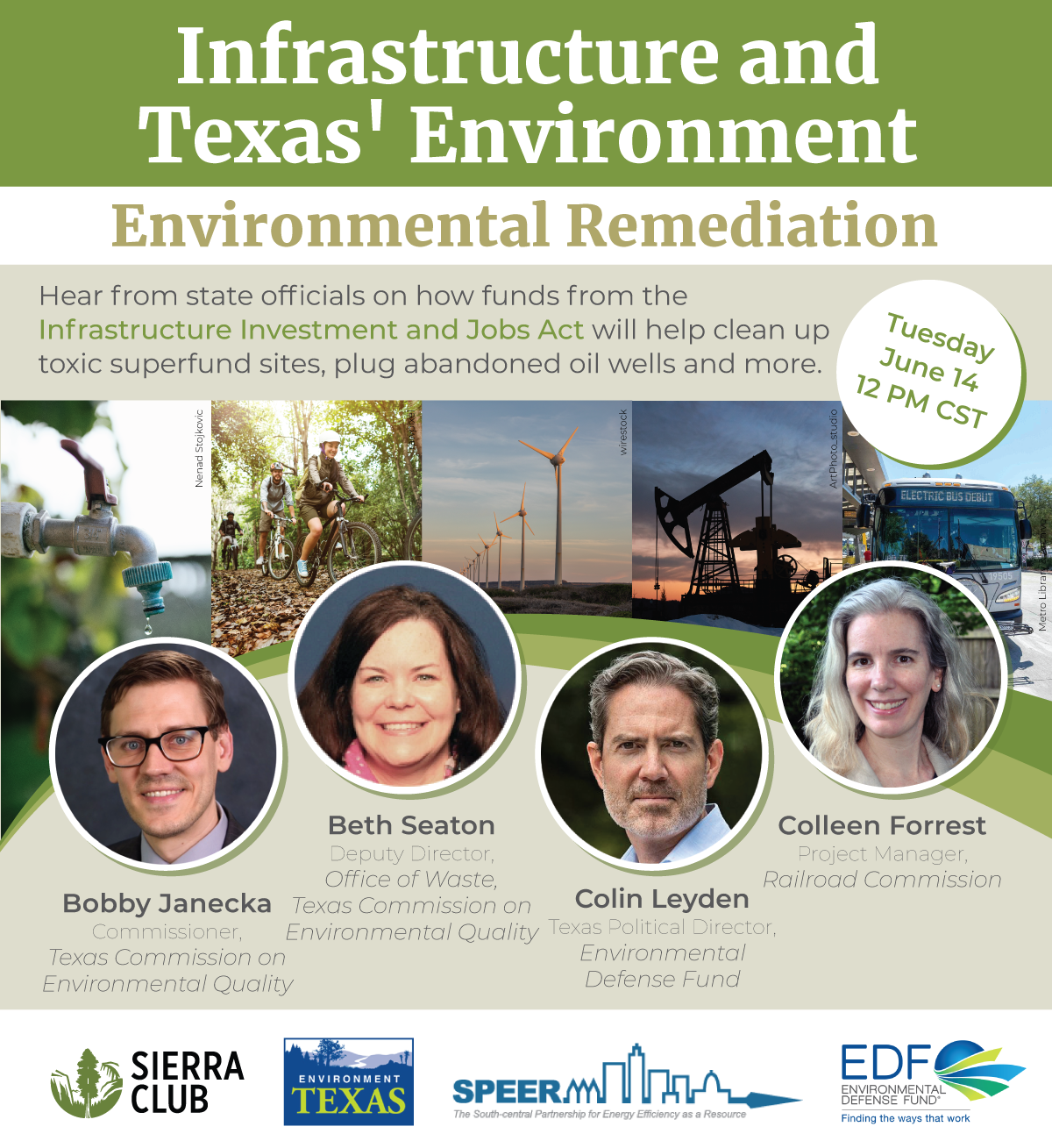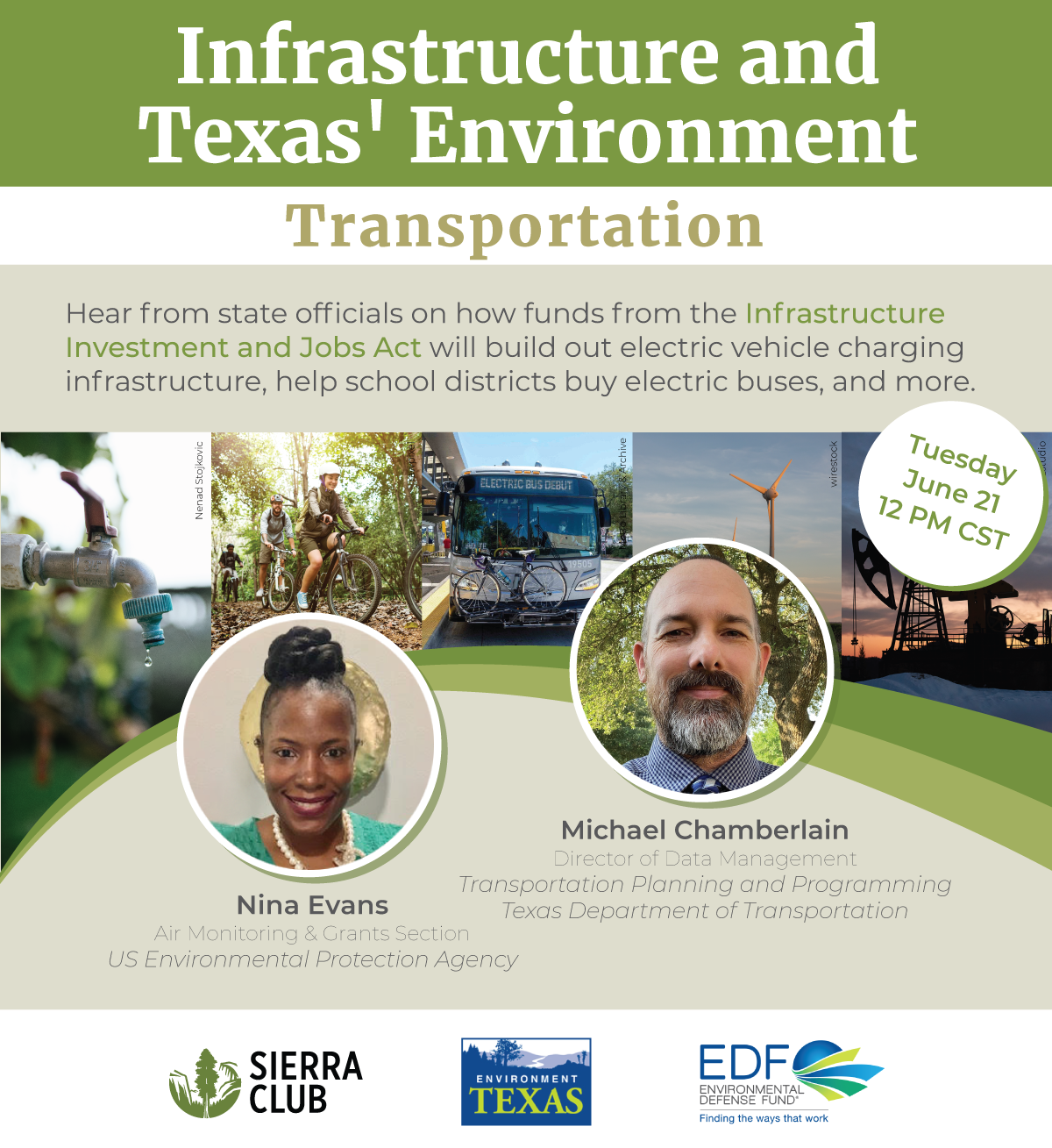By Cyrus Reed
Late last year, President Biden signed into law the Bipartisan Infrastructure Plan (BIP), a massive five-year $1.2 trillion infrastructure funding plan that could bring massive benefits to Texas. Also known as the Infrastructure Investment and Jobs Act (IIJA for short) the new law is just beginning to bear fruit, as state agencies, local governments, and even some private entities seek funding from the federal government.
To bring some light on the opportunities and challenges to the state of Texas, Sierra Club’s Lone Star Chapter joined forces with Environment Texas and some other organizations, such as the Environmental Defense Fund, National Wildlife Federation, and SPEER (South-Central Partnership for Energy Efficiency as a Resource), to hold a series of four webinars with state agency officials on a number of the different buckets of money available under the IIJA.
We had great turnout from other organizations, state and local officials, and legislative offices during the four June webinars.
First, on June 7, we were joined by Michael DeYoung from theTexas Department of Housing and Community Affairs (TDHCA) and Eddie Treviño from the State Office of Energy Conservation (SECO), a division of the Texas Comptroller of Public Accounts. DeYoung addressed how more than $170 million could be coming for use by TDHCA for weatherization of Texas’s homes and apartments, a direct benefit to low-income families in Texas. Normally, Texas only gets about $8 million per year in this type of federal funding. DeYoung also addressed other pots of money, such as the Low-Income Heat and Energy Program (LIHEAP), which was also increased by Congress for the coming year.
Treviño discussed a number of programs and funding sources that could come to SECO to help public entities lower energy use, ensure a more reliable grid, as well as a competitive grant to allow for low-interest loans for residential and commercial electric consumers.

A full recording of the June 7 webinar can be found here.
Meeting Recording:
Access Passcode: x5@2HFay
Second, on June 14, we were joined by Colin Leyden with EDF’s Texas Office, Texas Commission on Environmental Quality (TCEQ) Commissioner Bobby Janecka, TCEQ specialist Beth Seaton, and the Texas Railroad Commission’s Colleen Forrest to discuss pots of money coming to both agencies for clean up of environmental brownfields and abandoned wells.
Leyden noted the large number of wells that could be cleaned up with huge benefits on reducing methane pollution as well as preventing water pollution. Janecka and Seaton noted that the federal funds could help spur cleanup of multiple polluted superfund sites in Texas, and potentially other “brownfield” sites that are going through a cleanup process.
Finally, Forrest noted that up to $343 million in federal funds could come to Texas if the Railroad Commission is successful in its applications. Given the state has only been allocating roughly $25 million per year for wells that have been abandoned, the large amount available to Texas is a huge opportunity to finally plug and clean up thousands of wells that are harming Texas’s health and environment. The Railroad Commission has created a specific webpage to bring information to the public and potential contractors about the federal orphan well plugging program.

A full recording of the June 14 event can be found here.
Meeting Recording:
Access Passcode: yk?K27%S
On June 21, we were joined by Luke Metzger from Environment Texas and several officials from the US Environmental Protection Agency to discuss their Clean School Bus program, a gigantic $5 billion competitive grant program to help school districts purchase new electric buses (or other buses that run on alternative fuels). Under the IIJA, at least half the money must be spent on electric buses. Metzger noted the huge benefits that could ensue from transitioning away from fossil fuel-based buses to clean school buses.
In addition, Michael Chamberlain from the Texas Department of Transportation (TXDOT) laid out their plans on how to use approximately $400 million from the U.S. Department of Transportation for the creation of a statewide EV-charging network that will lead to a fast-charging electric vehicle network across the state. TXDOT released their public plan recently and took public comment before submitting it to the federal government. A copy of that plan is available here.

The full webinar can be viewed here.
Meeting Recording:
Access Passcode: icJNg=2M
Finally, on June 28, we were joined by Daniel Goshen and Amanda Fuller of National Wildlife Federation as well as outreach specialist Enriqueta Caballero from the Texas Water Development Board (TWDB), as they discussed the opportunities coming from billions of dollars being directed to the state under two funds: the Drinking Water State Revolving Fund and the Clean Water State Revolving Fund.
Public and some private utilities could take advantage of billions of dollars in new funds being managed by the TWDB for drinking water, wastewater treatment, and flood control among other issues. NWF spoke about the opportunity to bring equity and nature-based infrastructure into the discussion.
The full webinar can be viewed here.
Meeting Recording:
Access Passcode: $ng94WY9
The issues discussed during our June series were just some of the programs that can be funded by the IIJA. We are working on another set of webinars with other state agencies that could take advantage of these new federal funds.
For more information about the IIJA and upcoming opportunities, feel free to reach out to Cyrus Reed, our Conservation Director.